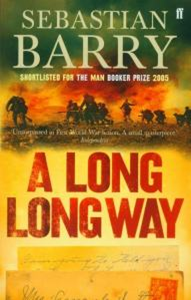
Willie returns to his regiment. He feels hollowed out by the war, broken hearted and empty. He notices that there are few Irishmen travelling to the front. The former general of the fifth army, ‘The Mutineer’ Gough, is one of many voices attesting to the untrustworthiness and cowardliness of the Irish soldiers of the 16th. Willie reflects that ‘Tipperary’ will not be sung any more. Similar contempt for British soldiers like himself is expressed amongst the Irish at home. It is demoralising and painful thought for Willie, who more and more experiences the signs of extreme depression and the inability to feel pleasure.
Christy Moran tells Willie that most of the regiment has been replaced with men from Newcastle. Willie greets Joe Kielty, who, to his wonder, was not killed in the German attack near St. Quentin. Moran, in a thoughtful gesture that Willie appreciates, gives him Timmy Weekes’ copy of Dostoevsky’s The Prince.
Major Stokes is found hanged in a barn, leaving a note for his wife and children.
The Americans have entered the war, and plans to conscript in Ireland have been shelved. Willie and his fellow Irishmen are the last Irishmen who will fight in Flanders. The presence of new American troops in large numbers coincides with the Hundred Days Offensive and the final push forward across Flanders to what will be an Allied victory. Willie is surprised as he is marched forward across the destroyed, scorched earth landscape to feel something of his first determination on joining the army. He sees the potential for building in the country.
Willie sees the end of the war approaching and gathers his thoughts about it. He admires Christy Moran’s dogged persistence and compares him favourably to the leaders of nations. He sees this impulse in the revolutions attempted everywhere- including Ireland. He feels outcast now, however, with no sense of country or belonging. He resolves to learn the lessons of Jesse Kirwan’s death in the years to come, but cannot reconcile his relationship with Ireland or Britain, and feels exiled from both.
Willie and his platoon arrive at St Court, where German soldiers hold a bridge with the aid of distant artillery. They wait in the dark night by a river marsh for instructions on how to proceed. Willie hears an owl hooting and then, from the German side, Willie hears a soldier singing ‘Stille Nacht, Heilige Nacht’. He is struck by the voice, which seems harsh and ominous. He turns the words ‘Silent night, holy night’ over in his head and hopeful aspiration and despair contend within him. He feels alone. He sings in reply to the German voice. A shot rings out, and Willie is shot dead. Joe Kielty catches him as he falls.
As he dies, Willie sees four angels. Each has the face of Jessie Kirwan, Father Buckley, the German that Willie killed, and Captain Pasley, the captains of Willie’s soul. Willie is buried in Flanders with Christy Moran’s medal, in the ground where thirty thousand Irishmen are also buried.
Tragically, a letter of apology from Willie’s father, James Dunne, arrives too late to for his son to read. He apologises for his foolishness and declares his pride in his son. He asks Willie’s forgiveness for his anger and recalls his pledge to his wife to look after all his children. He ends with the words, ‘Your loving father’. The letter is sent back to Dunne with Willie’s property- his soldiers small book, the copy of ‘The Idiot’ and the dead German’s porcelain horse. When older, Dolly takes the book to America. Willie’s father eventually goes mad and ends up in a county home for the elderly and insane.
Willie is buried quickly. The regiment moves onward, pursuing the fleeing Germans. He is buried near the place where he fell, with Kielty making the oration and Moran attending, noting the site of the burial in their maps, before moving on.
